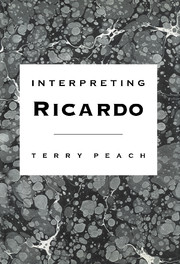Book contents
- Frontmatter
- Contents
- Preface
- Acknowledgements
- 1 Interpretations of David Ricardo
- 2 From bullion to corn: the early writings
- 3 The falling rate of profit, wages and the law of markets
- 4 The labour theory of value (I)
- 5 The labour theory of value (II)
- 6 The appropriation of Ricardo
- 7 Concluding remarks
- Bibliography
- Index
5 - The labour theory of value (II)
Published online by Cambridge University Press: 03 February 2010
- Frontmatter
- Contents
- Preface
- Acknowledgements
- 1 Interpretations of David Ricardo
- 2 From bullion to corn: the early writings
- 3 The falling rate of profit, wages and the law of markets
- 4 The labour theory of value (I)
- 5 The labour theory of value (II)
- 6 The appropriation of Ricardo
- 7 Concluding remarks
- Bibliography
- Index
Summary
This chapter completes the chequered history of Ricardo's ‘labour theory’ involvement. The first section begins with a review of the relevant correspondence between 1818 and 1820, during which time Malthus launched his devastating salvo on Ricardo's treatment of value in the form of the half-ounce-of-silver riddle; I next consider the published version of Malthus's critique, contained in his own Principles, together with Ricardo's responses; and then, to close the section, I intrude on Ricardo's private grief as he set about rewriting his chapter ‘On Value’ in the light of Malthus's criticisms. The substantive changes to the chapter ‘On Value’ in Ricardo's third edition are documented and discussed in the second section. The final section, divided into four sub-sections, focuses on various aspects of Ricardo's later writings. In the first sub-section, I highlight the ‘scientific’ input to Ricardo's conception of a ‘perfect’ measure of value; in the second, I report his increasing tendency to associate (one concept of) ‘value’ with the physical expenditure of labour time; in the third, I show that he also retained a more conventional concept of ‘value’ in the form of (relative) cost of production; and in the fourth, I endeavour to explain the functions of the illusory ‘perfect’ measure of value. A conclusion follows.
BETWEEN THE SECOND AND THIRD EDITIONS OF THE PRINCIPLES
Correspondence
Soon after revising the Principles for its second edition, Ricardo read Torrens's article in the Edinburgh Magazine (‘Strictures on Mr. Ricardo's Doctrine respecting Exchangeable Value’).
- Type
- Chapter
- Information
- Interpreting Ricardo , pp. 189 - 240Publisher: Cambridge University PressPrint publication year: 1993



